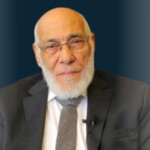In his Sahīh, Imam al-Bukhārī collected the following hadīth, narrated by Sa’īd, that Umm Khālid bint Khālid bin Sa’īd (radiy Allahu ‘anhum) said,
I came to Allah’s Messenger along with my father and I was wearing a yellow shirt. Allah’s Messenger said, ‘Sanah, sanah!’ (Abdullāh, the sub-narrator said, ‘It means, ‘Nice, nice!’ in the Ethiopian language.)
Then I started playing with the Seal of Prophethood. My father admonished me. But Allah’s Messenger said (to my father), ‘Leave her.’ Allah’s Messenger (then addressing me) said, ‘May you live so long that your dress gets worn out, and you will mend it many times, and then wear another until it gets worn out’ (i.e. may Allah prolong your life).” (The sub-narrator, Abdullāh, said, ‘That garment (which she was wearing) remained usable for a long period.’) [1]
The beauty of Islam is that it is not only a religion but a way of life that has been prescribed to us through the revelation of the Qur’ān as well as the Sunnah of the Prophet ﷺ. Through the hadīth, the teachings of the Prophetic Sunnah have been preserved in unbroken chains of narration which continue to this day. Ahadīth such as the one above are of extraordinary significance to the life of the believer.
These anecdotes provide us with first-hand insights into the exalted conduct of the Prophet ﷺ — a role model for all believers and whom we should strive to emulate in every aspect of our life.
Parenting is certainly no exception, and there are many lessons we can derive from this beautiful hadīth of Umm Khālid with regards to our interactions with our children.
Our words last a lifetime
First and foremost, what stands out regarding this hadīth is the time and context in which Umm Khālid is narrating. This encounter with the Prophet ﷺ must have occurred when she was a young child.
It is only many years later, however, that she narrates the incident as an adult. What is more, she doesn’t only narrate the story, she recalls even the finest and smallest of details, from the colour of the dress she was wearing that day, to the du’ā that the Prophet ﷺ made for her at the end.
Considering the clarity with which Umm Khālid remembered this encounter, it is evident that it became a memory she would treasure for a lifetime. From this, we can infer an important realisation: that children can remember those words and actions which may not necessarily seem particularly significant at the time.
As parents, there are times when we may say words that are harsh or hurtful in a moment of frustration, without really appreciating the impact these utterances could have upon our children in the future or even throughout their lives.
Numerous psychological studies have demonstrated that when a child is labelled negatively, they may end up internalising and adopting those characteristics. This is a phenomenon known as a self-fulfilling prophecy, and the implications can extend far beyond childhood and into adulthood as well.
Alternatively, if we praise a child and speak kindly to them, this can have a lasting positive and uplifting effect on them. A child who knows they are understood, acknowledged, and loved will not only demonstrate constructive behaviour but will also be more confident and have stronger self-esteem.
It is crucial, therefore, that as parents we understand the weight of the responsibility we bear as well as the impact that our words and actions can have upon our children. It is something that should never be taken lightly because — as Umm Khālid remembered the kindness of the Prophet ﷺ years after this encounter — our children will remember the way we behaved towards them at various points in their childhood, long after they have become adults.
Allow children to be in the company of adults
In the hadīth, Umm Khālid was accompanying her father when he went to see the Prophet ﷺ. This is something that can be found in many narrations of the Sahāba, who would frequently bring their children along to his gatherings (ﷺ).
This is in stark contrast to the cultural practices which continue to be prevalent in some communities today, where children are prevented from participating in “important” adult gatherings. Such an approach often isolates and shelters children from invaluable life lessons.
When your child is exposed to the presence of other adults, they can be taught skills and behaviours which will be indispensable to them throughout their life — if it’s in an environment that fosters positivity, understanding, and learning. Children are at a crucial developmental phase and interacting with individuals from all stages of life can promote healthy and accelerated development.
It has long been known that children who spend more time in the company of attentive adults will mature much more quickly, and as a parent the sooner you bring your child into the community the sooner you can ensure their psychological and emotional development will flourish in conjunction with their biological development.
Communicate in their language
In the hadīth, the Prophet ﷺ complimented Umm Khālid by saying “sanah, sanah”, which means “good, good” in Abyssinian. This was Umm Khālid’s mother tongue, and we can see here that the Prophet ﷺ went out of his way to address her in the language she was most comfortable with. He (ﷺ) also acknowledged her presence by not only engaging with but complimenting her.
As adults, we should try to emulate the Prophet’s conduct (ﷺ) with children by communicating with our child on their level, thereby encouraging a feeling of friendship and understanding with kind words.
When we communicate with a child on their terms, we are setting the foundation for a strong relationship based on trust, affection, and assurance. Our children will be more forthcoming because they associate us with compassion and comfort, and it will become their natural inclination to turn towards us for fulfilment and empathy.
Be friendly and welcoming
Continuing from the third lesson, we can see the immediate effect that this warm welcome had upon Umm Khālid, who narrated,
Then I started playing with the Seal of Prophethood (which was between the two shoulders of the Prophet ﷺ).” [1]
This must have meant that the Prophet ﷺ had come down to Umm Khālid’s level for her to be able to reach the Seal of Prophethood, demonstrating how welcoming the Prophet ﷺ was towards children.
The Prophet’s kind demeanour (ﷺ) meant that she felt comfortable enough being around him to approach and begin playing on friendly and affectionate terms.
As parents, it is always important that we spend a few moments of introspection thinking about our demeanour with our children. There is no doubt that they are beloved to us, but do we consciously try to create an environment where they are happy, content, and can truly be themselves?
Or do we inadvertently create a hostile and strict atmosphere in which our child lacks confidence and security when they are around us? When a child knows they are unconditionally loved, they will be more open to not only playing with us but also communicating and looking up to us whenever they need guidance or advice.
Be lenient with children
In the hadīth, Umm Khālid narrates that when she was playing with the Seal of Prophethood,
My father admonished me. But Allah’s Messenger ﷺ said (to my father), ‘Leave her.’” [1]
One question which certainly comes to mind is how would we react if we were to be in this situation?
There are times when we are so quick to rebuke and scold our children when they are playing with something they should not be, and hasty to lose our temper when they make a mess or speak too loudly. The thing is, however, these are often harmless and temporary behaviours that are typical of any normal child.
The Prophet ﷺ intuitively understood that children are endlessly inquisitive and curious by nature, which means they have not necessarily learned yet the boundaries of what is right and what is wrong. When Umm Khālid’s father admonishes her for her behaviour, the Prophet ﷺ says, “Leave her” and does not interrupt her playing.
Sometimes we just need to understand that children are so much more sensitive to and excited by stimuli than adults are, as we once were at that age. By letting them be, and allowing a child to be a child — at least within the home — we can create an environment of learning, exploration, and adventure. And whilst some boundaries are important, we do not want the home to be a place of imposed orders and unexplained prohibitions, inhibiting the curiosity which is so crucial to their development.
Make du’ā for them
As the hadīth comes to an end, Umm Khālid says,
Allah’s Messenger ﷺ (then addressing me) said, ‘May you live so long that your dress gets worn out, and you will mend it many times, and then wear another till it gets worn out’ (i.e. may Allah prolong your life).” [1]
It is then narrated that Umm Khālid did indeed go on to live for many years following this encounter.
Considering she was a child at the time, Umm Khālid remembers the du’ā the Prophet ﷺ made for her with stunning clarity. Any why not? Du’ā is one of the most empowering tools that a believer has at their disposal, a means through which we can communicate with Allah and know without a doubt that He is hearing every word we say.
Always remember to make du’ā for your child. Parenting is a momentous and at times challenging experience, but it is certainly a comfort to know that the Prophet ﷺ said that the du’ā a parent makes for his or her child is never rejected by Allah.
No matter what the circumstances or difficulties may be, du’ā has the power to change everything. What is more, the Prophet ﷺ recited the du’ā aloud in the presence of Umm Khālid, and this meant a great deal to her.
By making du’ā in the presence of our children, we can bolster their confidence because they will know we desire only the best for them, in this world as well as the Hereafter.
May Allah make us of those who can learn and implement these valuable lessons taught to us by the best of all creation, sall Allāhu ʿalayhi wa sallam.
Source: Islam21c
Notes
[1] Sahīh al-Bukhārī, 3,071; https://sunnah.com/bukhari:3071








Allahumma baarik, alhamdulillah an amazing Hadith used to elaborate the topic with a focus in the child’s emotional development especially the part in vocalising parent’s dua in front of the child as a complimentary tool in boosting their confidence.
Very informative article!